Tiếng Anh 7 Smart World Unit 10 Lesson 1
Tiếng Anh 7 I-learn Smart World Unit 10 Lesson 1
Trong bài viết này, VnDoc giới thiệu tới các em Soạn Tiếng Anh 7 Smart World Unit 10 Lesson 1. Sau đây mời các em tham khảo chi tiết.
New Words
a. Fill in the table. Listen and repeat.
(Điền vào bảng. Nghe và lặp lại.)
Bài nghe
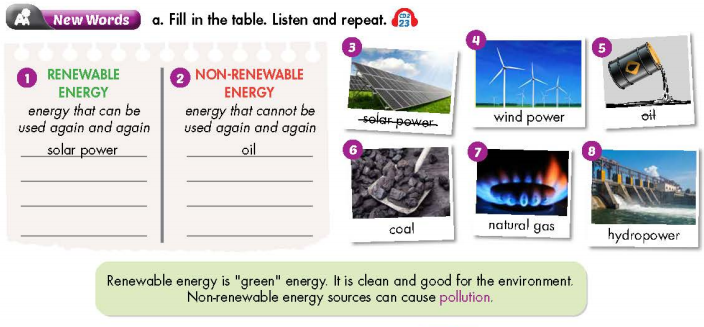
Gợi ý đáp án
|
Renewable energy |
Non - renewable energy |
|
energy that can be used again and again solar power wind power hydropower |
energy that cannot be used again and again oil natural gas coal |
b. In pairs: Discuss which renewable energy source could be useful where you live.
(Theo cặp: Thảo luận những năng lượng tái tạo có thể giúp ích cho nơi bạn sinh sống.)

Gợi ý đáp án
A: Which energy source could we use in our town?
B: We could use solar power and wind power.
Listening
a. Listen to Emma and James talking to experts at an energy convention. What do they want to learn about?
(Nghe về Emma và James nói chuyện với chuyên gia ở một hội nghị năng lượng. Họ nghiên cứu về điều gì?)
Bài nghe

Gợi ý đáp án
1. different energy sources
Nội dung bài nghe
Announcer: Welcome everyone to this year's Energy Convention.
Emma: Hi, are you from Greenwood Energy?
Michael: Yes. My name's Michael. How can I help you?
Emma: How much energy does Greenwood get from coal?
Michael: It gets sixteen percent from coal.
Emma: Did you say sixty or sixteen?
Michael: Sixteen percent.
Emma: How much energy does it get from renewable sources?
Michael: Fifty percent. We use lots of wind power.
Emma: OK. Thank you.
Michael: You're welcome.
James: Hi, are you Ann from Maple Falls Energy?
Ann: Yes.
James: Can I ask you some questions?
Ann: OK.
James: How much energy does Maple Falls get from coal?
Ann: Sixty percent.
James: How much energy does it get from wind power?
Ann: Just under three percent.
James: Thank you. Hey Emma, Maple Falls gets less than three percent of its energy from renewable sources.
Emma: Greenwood gets fifty percent. It uses more renewable energy sources than Maple Falls.
James: So, Greenwood is greener than Maple Falls.
b. Now, listen and circle True or False.
(Bây giờ, nghe và khoanh đúng hoặc sai.)
Bài nghe

Gợi ý đáp án
|
1. True |
2. False |
3. True |
4. False |
5. True |
Lời giải chi tiết
1. True
Michael works for Greenwood Energy.
(Michael làm việc cho Năng lượng Greenwood.)
Thông tin:
Emma: Hi, are you from Greenwood Energy?
Michael: Yes. My name's Michael. How can I help you?
2. False
Greenwood gets 22% of its energy from coal.
(Greenwood nhận 22% năng lượng từ than.)
Thông tin: Michael: It gets sixteen percent from coal.
3. True
Half of Greenwood's energy comes from renewable sources.
(Một nửa năng lượng của Greenwood đến từ nguồn năng lượng tái tạo.)
Thông tin:
Emma: How much energy does it get from renewable sources?
Michael: Fifty percent. We use lots of wind power.
4. False
Maple Falls gets 16% of its energy from coal.
(Tháp Maple chứa 16% từ than.)
Thông tin:
James: How much energy does Maple Falls get from coal?
Ann: Sixty percent.
5. True
Greenwood uses more renewable energy than Maple Falls.
(Greenwood sử dụng năng lượng tái tạo nhiều hơn tháp Maple.)
Thông tin: Emma: Greenwood gets fifty percent. It uses more renewable energy sources than Maple Falls.
c. In pairs: What sources of energy does your country use? Do you think it uses more non-renewable or renewable energy?
(Theo cặp: Nguồn năng lượng nào đất nước bạn sử dụng? Bạn nghĩ nó sử dụng nhiều năng lượng không tái tạo hay năng lượng tái tạo?)
Gợi ý đáp án
A: What sources of energy does your country use?
B: My country use energy from water, sun, oil and coal.
A: Do you think it uses more non-renewable or renewable energy?
B: I think it use more non-renewable energy.
Conversation Skill
Asking for clarification
Listen and repeat.
(Nghe và lặp lại.)
Bài nghe
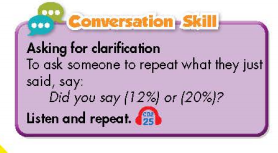
Grammar
a. Listen and repeat.
(Nghe và lặp lại.)
Bài nghe
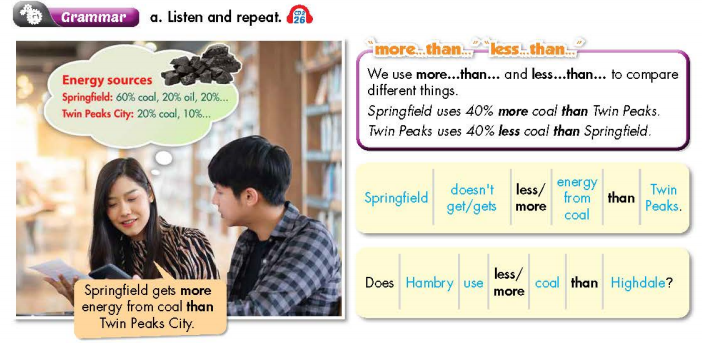
b. Unscramble the sentences.
(Sắp xếp câu.)
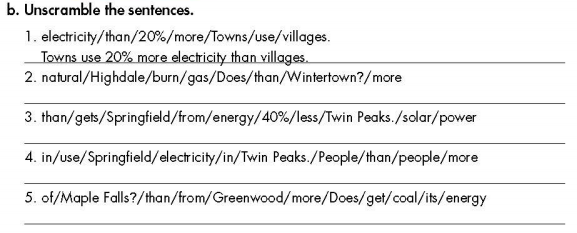
Gợi ý đáp án
2. Does Highdale burn more natural gas than Wintertown?
3. Springfield gets 40% less energy from solar power than Twin Peaks.
4. People in Springfield use more electricity than people in Twin Peaks.
5. Does Greenwood get more energy of its from coal than Maple Falls?
c. Look at the table and write the sentences.
(Nhìn bảng và viết câu.)
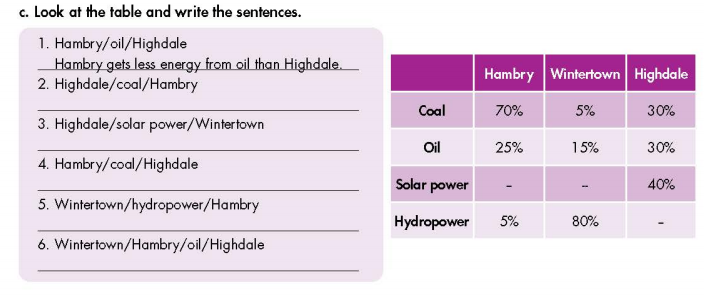
Gợi ý đáp án
2. Highdale gets less energy from coal than Hambry.
3. Highdale gets 40% more solar power than Wintertown.
4. Hambry gets more energy from coal than Highdale.
5. Wintertown gets more energy from hydropower than Hambry.
6. Wintertown and Hambry get less energy from oil than Highdale.
Pronunciation
a. Stress the first syllable for numbers which are multiples of ten.
(Nhấn mạnh âm tiết đầu tiên cho các số tròn chục.)
b. Listen to the words and focus on the underlined letters.
(Nghe từ và chú ý từ được gạch chân.)
Bài nghe

c. Listen and cross out the word that doesn't follow the note in "a."
(Nghe và loại bỏ từ mà không tuân theo ghi chú ở phần a.)
Bài nghe

d. Read the words with the correct stress to a partner.
(Đọc từ với trọng âm đúng cùng với bạn của em.)
Practice
Ask and answer. Then, compare energy sources in Bigton and Greenville. Swap roles and repeat.
(Hỏi và trả lời. Sau đó, so sánh các nguồn năng lượng ở Bigton và Greenville. Hoán đổi vai trò và lặp lại.)
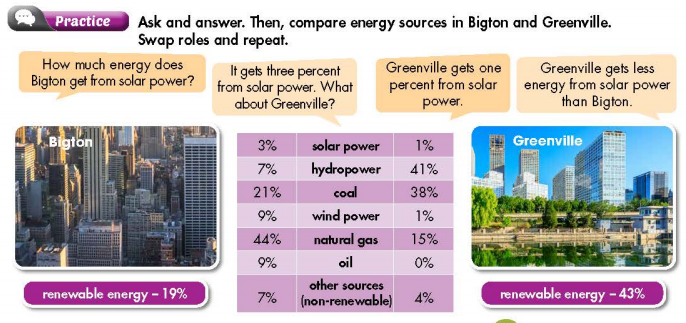
Gợi ý đáp án
A: How much energy does Bigton get from hydropower?
B: It gets seven percent from hydropower. What about Greenville?
A: Greenville gets forty one percent from solar power.
B: Greenville gets less energy from hydropower than Bigton.
***
B: How much energy does Bigton get from coal?
A: It gets twenty one percent from coal. What about Greenville?
B: Greenville gets thirty eight per cent from coal.
A: Greenville gets more energy from coal than Bigton.
Speaking
a. You're an energy expert interested in how two different cities use different kinds of energy.
(Bạn là một chuyên gia quan tâm về việc hai thành phố khác nhau sử dụng những loại năng lượng khác nhau như thế nào.)
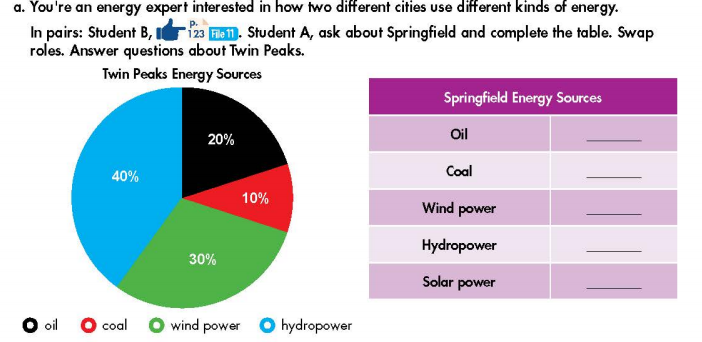
Gợi ý đáp án
A: How much energy does Springfield get from oil?
B: It gets fifty percent from oil.
A: What about energy from coal?
B: Springfield gets twenty percent from coal.
A: How much energy does Springfield get from wind power?
B: Springfield gets five percent from wind power.
A: How much energy does Springfield get from hydropower?
B: Springfield gets five percent from hydropower.
A: How much energy does Springfield get from solar power?
B: Springfield gets twenty percent from solar power.
b. Compare the energy sources for Twin Peaks and Springfield. Which city uses more renewable energy?
(So sánh nguồn năng lượng giữa Twin Peaks và Springfield. Thành phố nào sử dụng nhiều năng lượng tái tạo hơn?)
Gợi ý đáp án
Twin Peaks city uses more renewable energy than Springfield.
Xem tiếp: Giải SGK Unit 10 Lesson 2 Energy Sources MỚI
VnDoc xin giới thiệu Soạn Tiếng Anh 7 i-learn Smart World theo từng Unit các hướng dẫn giải chi tiết cho từng phần trong SGK Tiếng Anh lớp 7 mới, kèm với đó là file nghe giúp các em hiểu bài học dễ dàng hơn.
Trên đây VnDoc đã giới thiệu tới các bạn Unit 10 Lesson 1 Energy Sources, hy vọng đây là tài liệu học tập hữu ích dành cho quý phụ huynh, thầy cô và các bạn học sinh.









